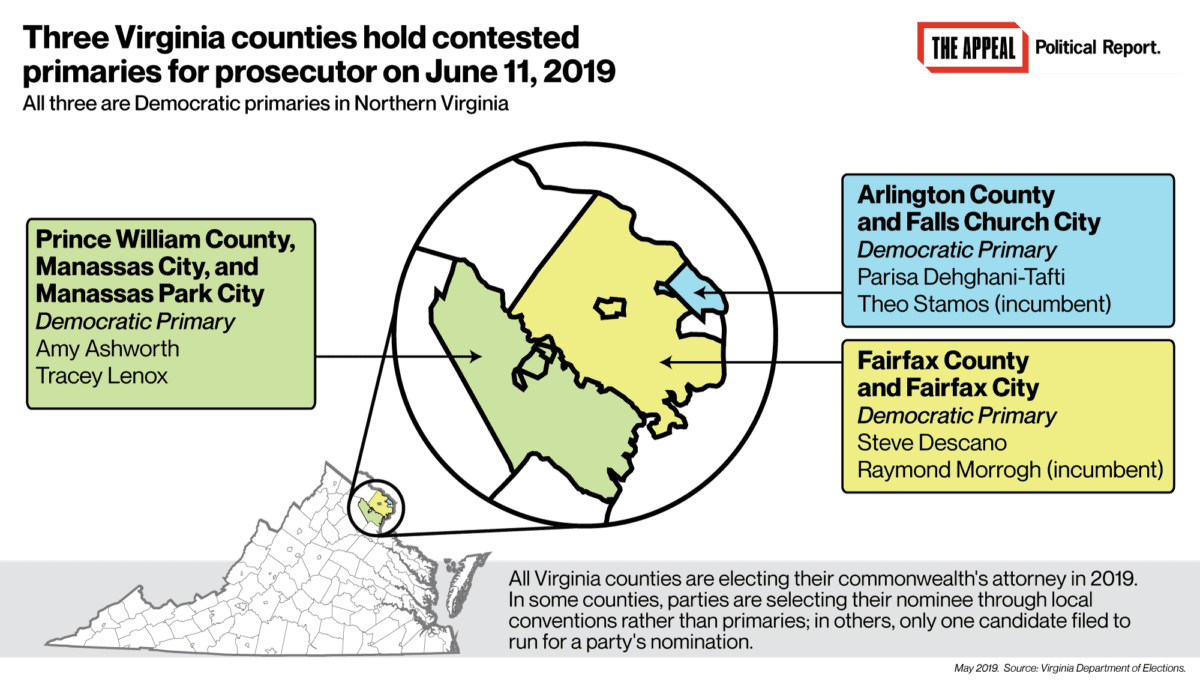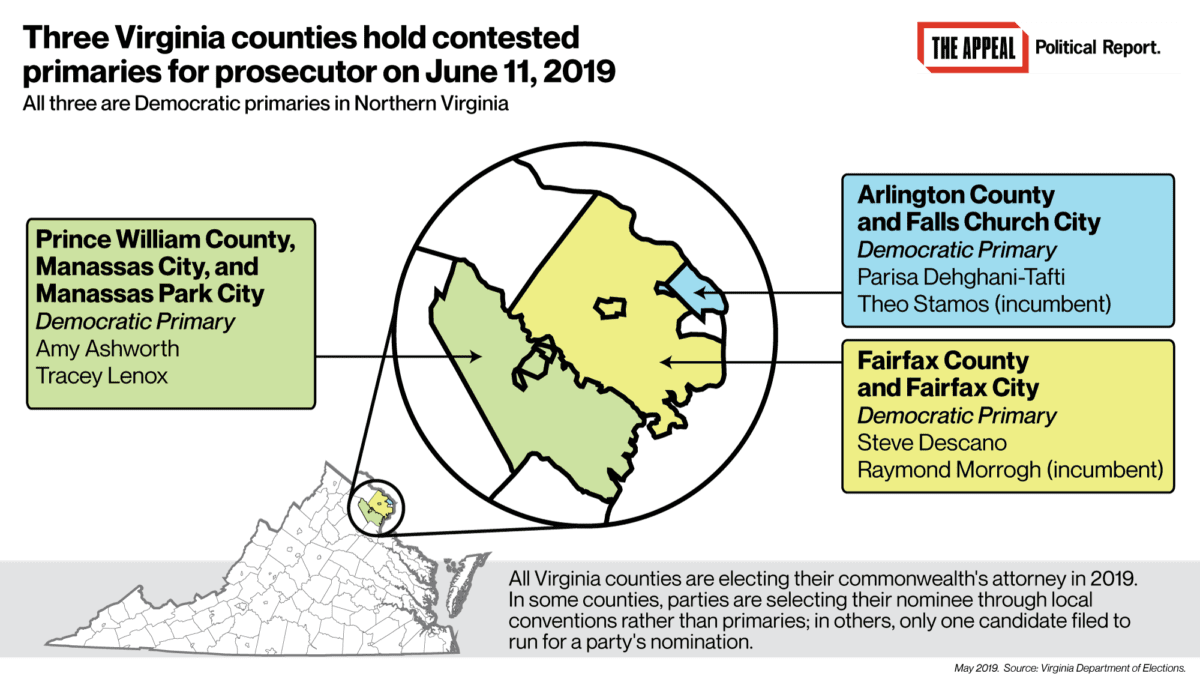Tuesday's Elections Could Overhaul Prosecution in Northern Virginia
Virginians are voting for their prosecutors in Arlington, Fairfax, and Prince William counties.
Daniel Nichanian | June 6, 2019
This article originally appeared on The Appeal, which hosted The Political Report project.
Virginians are voting for their commonwealth’s attorneys in Arlington, Fairfax, and Prince William counties.
The nationwide push to overhaul prosecutorial practices has reached Virginia, which hosts three contested elections for commonwealth’s attorney on Tuesday. These are powerful officials who shape the local legal system, while wielding outsize influence on state lawmaking.
These three elections are all Democratic primaries in populous Northern Virginia counties, and the results of each could substantially transform local approaches to prosecution.
Prince William Democrats are set to nominate their first candidate in half a century who is not Paul Ebert, a retiring prosecutor with a predilection for the death penalty.
But the widest contrasts lie elsewhere. Theo Stamos, the commonwealth’s attorney of Arlington County and Falls Church, is facing Parisa Dehghani-Tafti, a former public defender who is the legal director of the mid-Atlantic Innocence Project. Ray Morrogh, the commonwealth’s attorney of Fairfax County and Fairfax City, is facing Steve Descano, a former federal prosecutor.
Arlington and Fairfax counties
The two challengers are confronting the state’s criminal legal system as something that needs systemic reforms prosecutors can take on, beyond changing how they assess individual cases.
Dehghani-Tafti told me in an interview that her work as a defense attorney meant dealing with single cases as they came along—“plucking the babies out of the river,” she said—but that her candidacy was a way of “walking upstream” to “see who is throwing them in” and address the problem head-on. She said in her campaign announcement that she was running “to dismantle the mass incarceration machine.” Descano similarly told me in an interview that “if you were to have a prosecutor who was committed to making a dent in mass incarceration and ending mass incarceration, it would be within their powers” to do so, for instance by “changing the way that you charge crimes.”
Both challengers cast themselves as part of a broader movement to overhaul statewide practices.
Descano talked of creating “a coalition” to “act as a counterpoint” to the Virginia Association of Commonwealth’s Attorneys (VACA). VACA is the group that lobbies on behalf of Virginia prosecutors, typically for more punitive policies. Similarly, Dehghani-Tafti told me that she hoped “to be elected with a wave of other reform prosecutors;” she said of VACA that “right now, they don’t speak for me.”
Incumbents Morrogh and Stamos, by contrast, have served in VACA’s leadership. Both tout their interest in criminal justice reform, even as they have fought efforts to overhaul the legal system. In 2016, for instance, they signed on to a lawsuit against Governor Terry McAuliffe’s executive order restoring the voting rights of Virginians who have completed their sentences.
Morrogh testified in Congress in 2014 that the Obama Administration’s proposed sentencing reforms would “roll the dice with the safety of America’s communities.” His campaign did not respond to a request for comment about his view on the fairness of sentencing in Virginia.
Stamos told me that “Arlington does not engage in mass incarceration” when I asked her if she thought Virginia’s incarceration rate was too high.
In an event held in May 2018, she similarly said “mass incarceration” was “a term that is used to deligitimize what we do because there isn’t a prosecutor in this country that engages in mass incarceration.” Prosecutors “don’t round up people in a mass way,” she explained, but instead treat people as individuals.
But prosecutors enjoy wide discretion to handle individual cases in a more- or less-punitive manner. Kira Lerner reported in The Appeal this week on Stamos’s office’s history of aggressive charging practices, which have resulted in children being detained over low-level offenses.
A pattern of individual cases can accumulate into an unequal system. Stamos touted the decrease in the jail population, and it is true that Arlington’s per capita incarceration rate is lower than the statewide average, according to the Vera Institute of Justice’s database. But, for Black people, this rate is higher than the statewide average. African Americans make up 9 percent of Arlington’s population but approximately 60 percent of people who are convicted of marijuana possession, trespass, or larceny, according to an analysis by the state Supreme Court. Stamos told The Appeal that this disparity is due to people “coming into our community and committing offenses” from elsewhere. “Arlingtonians are very law-abiding, as it turns out,” she said. “It’s other folks coming from other areas of the region.”
The candidates’ differing attitudes toward systemic reform plays out in specific policy areas and in their understanding of prosecutorial discretion.
First, take the debate that has unfolded over marijuana. Dehghani-Tafti and Descano both told me they would decline to prosecute marijuana possession altogether. In rejecting that stance, Stamos and Morrogh have both criticized the very principle of declination (a default policy of not using certain charges). “I do not think it is the role of the Commonwealth’s Attorney to decide not to prosecute certain types of crimes because of her personal opinion,” Stamos told me in a written message. Morrogh has made the same point on the trail.
Dehghani-Tafti argues that it is misleading for prosecutors to minimize their discretion and to say they are merely enforcing laws. “This is a shell game of prosecutors saying, ‘we have no discretion, we just follow the law,’ and then turning around and making sure that none of their tools are taken away from them,” she told me, referring to prosecutors’ legislative lobbying. Last year, for instance, VACA opposed a bill to decriminalize marijuana possession.
Second, take voting rights. Stamos and Morrogh have said one reason for their suit against McAuliffe’s executive order restoring voting rights was the blanket nature of its first iteration, namely that it was meant to cover all cases at once. When courts overturned McAuliffe’s initial executive order, the governor turned to restoring voting rights on an individual basis.
Stamos told me of McAuliffe’s “en masse” order that “too many individuals whose rights were restored were still on probation, owed restitution to crime victims and, in some instances, still incarcerated at the time their rights were restored.” She said that she backs “comprehensive legislation” to expand rights restoration, but she did not answer whether she supports restoring the rights of people who are incarcerated or on probation, or of people who still owe financial obligations. Morrogh did not reply to my request for comment on disenfranchisement.
Both challengers are pushing far beyond McAuliffe’s position. Dehghani-Tafti told me that she supported the full abolition of felony disenfranchisement. This would allow people to vote from prison. Descano told me “I haven’t seen any reason why” anyone is stripped of the right to vote.
Both primaries are marked by other reform proposals and policy disagreements.
Death penalty: Both challengers ruled out seeking the death penalty in interviews with the Political Report. Neither incumbent has ruled it out. Stamos said in a debate that she would “be just fine” with the legislature repealing capital punishment.
Charging practices: In answer to my questions on declination, neither challenger listed charges other than marijuana that they’d decline to prosecute; others prosecutors have extended declination to broader categories, including in Dallas and Boston. But Descano said there were offenses that he would like to “prosecute in a different way,” and that a priority would be to reduce the share of people with felony convictions, for instance by refraining from filing the highest allowable charges. He told Inside Nova that he would not charge theft of property under $1,500 at the felony level. “I’m not going to ruin somebody’s life and put them in jail for stealing an iPhone or making a single mistake,” he said.
Diversion: Morrogh, the Fairfax prosecutor, has touted a program that prioritizes alternatives to incarceration for people with mental health or substance use problems. Descano, his challenger, told me that he would like to create diversion programs for which people qualify without needing to first plead guilty. Morrogh did not respond to a request for comment on whether he would expand pre-charge diversion options.
Prince William County
A commonwealth’s attorney since 1968, Paul Ebert has made Prince William County a national epicenter for the death penalty. The Post wrote last year that Ebert has obtained more capital sentences than “any other prosecutor in Virginia.” He replied that “very few” people “qualify for” the death penalty, but “for some reason, Prince William seems to get people who qualify.
This explanation obscures commonwealth’s attorneys’ discretion. He should know. His tenure has been marred by complaints of excessive or inappropriate behavior, including a case Radley Balko dubbed “one of the more brazen examples of prosecutor misconduct in recent memory.”
Ebert, a Democrat, is retiring this year after 51 years in office, and two Democrats are running to replace him in next week’s primary. Amy Ashworth is a former prosecutor who now works as a private attorney, and Tracey Lenox is a criminal defense attorney who is running with Ebert’s endorsement.
In separate interviews, both candidates highlighted changes they’d make to his office, though neither endorsed the bolder reforms proposed by Descano or Pahghani-Tafti. Both said they wanted to restrict the use of the death penalty, but neither ruled out seeking the death penalty.
Both talked of de-emphasizing prosecution and incarceration over low-level charges. Lenox told me she would seek to “divert and dismiss” most “nonvictim misdemeanor charges” because it “doesn’t make sense” to “be seeking convictions” for offenses like marijuana possession and driving with a suspended license. Ashworth mentioned the same examples to explain that “it is not smart to focus on prosecuting victimless crimes.” Regarding the scope of cases fit for diversion, she repeatedly specified that she was talking of first-time offenses.
Some prosecutors who look to de-emphasize low-level charges have rolled out declination policies, but Ashworth and Lenox both spoke against this approach, including for marijuana possession. Ashworth argued that a blanket declination policy would violate her oath of office. Lenox offered a more strategic explanation, namely that it could generate a backlash against reform among other stakeholders. “Diversion is the easier project, because then you can give the judges something to hang their hat on,” Lenox said.
A more straightforward difference emerged when I asked how they would each change the legal system’s approach to offenses involving violence. Both invoked Virginia’s non-mandatory sentencing guidelines (recommended ranges for different types of cases) in their response, but to contrary effects. Lenox questioned the guidelines’ neutrality, arguing that they reflect “norms” inherited from a time where “high incarceration was the solution to things;” she said she wants to create opportunities for below-guideline sentences. By contrast, Ashworth declined to assess the guidelines’ fairness, and emphasized the value of using them as a constraint in order to be consistent and reduce the disparities that can accompany sentencing.
Prince William County is one of only two counties in Virginia in ICE’s 287(g) program, which deputizes local law enforcement to act like federal immigration agents. While terminating this contract falls outside of the commonwealth’s attorney’s jurisdiction, both Ashworth and Lenox told me that they opposed the program and would advocate against it if elected.
Mike May, a former county supervisor, has already secured the GOP nomination. The county has a history of voting for candidates from both parties, so the general election could be competitive. The Political Report will return to May and the general election in the months ahead.




